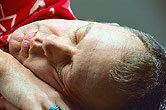- Could Your Grocery Store Meat Be Causing Recurring UTIs?
- Are You Making This Expensive Thermostat Error This Winter?
- Recognizing the Signs of Hypothyroidism
- 10 Strategies to Overcome Insomnia
- Could Artificial Sweeteners Be Aging the Brain Faster?
- Techniques for Soothing Your Nervous System
- Does the Water in Your House Smell Funny? Here’s Why
- Can a Daily Dose of Apple Cider Vinegar Actually Aid Weight Loss?
- 6 Health Beverages That Can Actually Spike Your Blood Sugar
- Treatment Options for Social Anxiety Disorder
Long Sleep Time, Higher Stroke Risk?


Adults who sleep more than eight hours a night may face a higher risk of stroke, a new analysis suggests.
These so-called “long sleepers” were 46 percent more likely to have a stroke than those who got only six to eight hours of sleep a night, the researchers found.
However, the researchers don’t know if the long sleep is a cause, consequence or early warning sign of declining brain health. After reviewing previous research on the possible link between sleep and stroke risk, they said they only found an association that they can’t explain.
The study is published online Feb. 25 in Neurology.
“Previous studies have already suggested a possible association between sleep and risk of stroke,” said lead researcher Yue Leng, of the University of Cambridge in England. But the new analysis also looked at the relationship between a change in sleeping duration over time and how that affected stroke risk.
While the possible link needs more research, Leng said the message is definitely not to cut sleep to reduce stroke risk. Adequate sleep is crucial for good health.
In the study, the researchers followed nearly 9,700 people participating in a European study, tracking their sleep patterns and any incidence of stroke for nearly 10 years. The men and women, average age 62 when the study started, reported their sleep duration once between 1998 and 2000, and again four years later. They told how many hours they slept a night and how well they slept.
About 70 percent said they slept six to eight hours a night. One in 10 said they slept more than eight hours. Those who slept less than six hours or more than eight were likely to be older, female and not physically active.
Over the follow-up period, 346 people had strokes. Those who slept longer than eight hours had a 46 percent increased stroke risk, and those who slept less than six hours had an 18 percent higher risk. But the number in the group reporting less than six hours of sleep a night was too small to call that link statistically solid, Leng said.
Those who reported being long sleepers in both of the two surveys faced double the risk of stroke when compared to those who reported average sleep times, according to the study.
And people whose sleep pattern changed — from sleeping less than six hours a night to more than eight hours a night — had about four times the risk of stroke as those who consistently got an average amount of sleep, Leng found.
Lack of sleep can lead to higher stress hormone levels, in turn raising blood pressure and stroke risk. But after Leng took factors such as high blood pressure into account, the relationship between long sleep and stroke risk persisted.
Dr. Alberto Ramos, an assistant professor of neurology at the University of Miami Miller School of Medicine, wrote an editorial to accompany the study. He suspects that the long sleeping time is a warning signal. But “the change in sleeping patterns is more the concern,” he said.
Long sleepers would be wise to monitor their lifestyle, eating a healthy diet and exercising regularly, Ramos said. Adults over the age of 60 or 65 who notice they are sleeping more should make sure their cardiovascular risk factors such as blood pressure and cholesterol are under control, he added.
More information
To learn more about stroke risk factors, visit U.S. Centers for Disease Control and Prevention.
Source: HealthDay
Copyright © 2026 HealthDay. All rights reserved.










